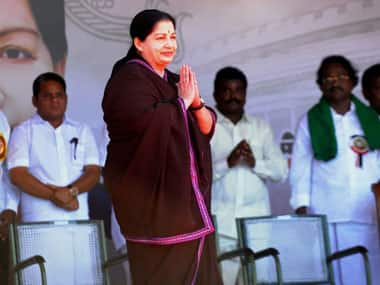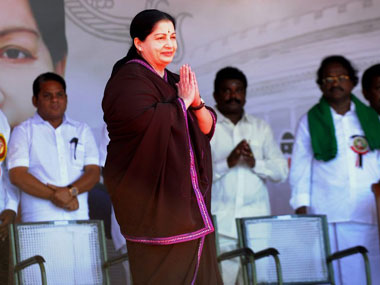The AIADMK party workers’ effusive public adulation for their leader J Jayalalithaa in a wide variety of ways has been an open affair for years, but in the Lok Sabha, it’s turning out to be nothing short of an amusing spectacle. Thirty seven MPs, invoking her name and singing her praise every time they speak is now a show of national interest. Her supporters call it respect for their leader while the critics call it sycophancy. [caption id=“attachment_1655899” align=“alignleft” width=“380”]
 J Jayalalithaa in a file photo. AFP[/caption] The
Times of India on Friday
made an interesting news story out of it. It started like this: “My namaskaram to my leader, Puratchithalaivi Tamil Tai Amma and our honourable Speaker, popularly known as Hindi Tai … Madam, with blessings of our leader, Puratchithalaivi Amma, I want to raise my first supplementary question.” The occasion was the intervention of an AIADMK MP for Coimbatore P Nagarajan during the question hour on Thursday. Apparently the house “burst out into guffaws”. The report goes on to add that her MPs “invoke her in every speech, every day. She appears in different forms, like a Goddess, as Puratchithalaivi, as Amma, as revolutionary leader and as the humble chief minister.” In the last four weeks, it has become a standing joke. No sooner does an AIADMK member stand up to speak that there is anticipation among MPs and observers on when would the speaker “bow to the bountiful”, the report says. The phenomenon, however is not new. In the state assembly, where they have a huge majority, the party MLAs invoke her name and pay respect to Jayalalithaa whenever they speak. Her party leaders, including ministers, bow and prostrate before her at important occasions. It’s nothing new. On Thursday, some newspapers published a picture of her MLAs rushing out of the assembly to see her off. Recently, when she warned the clubs in the city against their no-dhothi dress code, posters with an interesting image appeared across the city - global leaders including Barrack Obama wearing white dhoti and saluting her. In Dravidian politics, this sort of ionisation and heroism, in which leaders are hailed as supernatural legends accompanied by innovative imagery is nothing new; perhaps in AIADMK it becomes a spectacle because of its bench strength and its top down discipline. For the same reasons, in the present parliament, it may look and sound amplified because instead of a handful of MPs earlier, the party has 37 MPs and they all vie with each other in their adulation, perhaps in a bid to grab their leader’s attention. The party leaders reportedly dismiss the charges of sycophancy. The same Times of India report quotes the AIADMK parliamentary party leader Thambidurai: “You must know that they are all first-time speakers. Everyone is making his or her maiden speech. So, they are bound to remember their leader.” While parrying charges of sycophancy, her supporters also refer to how the BJP MPs hail Narendra Modi and Congress MPs refer to Rahul Gandhi and Sonia Gandhi in their speeches. Perhaps it’s the old stereotypes that date to the 1980s and 1990s that make the Dravidian parties look like an exception. Sycophancy has become an inalienable part of Indian parliamentary democracy. In Congress, it’s the submission of the nationwide party structure, even for the election of district secretaries, to the “high command” for whatever it means; and for the BJP, it’s the voice of one man, as Rahul Gandhi charged a couple of days back. Inner party democracy works only on paper.
J Jayalalithaa in a file photo. AFP[/caption] The
Times of India on Friday
made an interesting news story out of it. It started like this: “My namaskaram to my leader, Puratchithalaivi Tamil Tai Amma and our honourable Speaker, popularly known as Hindi Tai … Madam, with blessings of our leader, Puratchithalaivi Amma, I want to raise my first supplementary question.” The occasion was the intervention of an AIADMK MP for Coimbatore P Nagarajan during the question hour on Thursday. Apparently the house “burst out into guffaws”. The report goes on to add that her MPs “invoke her in every speech, every day. She appears in different forms, like a Goddess, as Puratchithalaivi, as Amma, as revolutionary leader and as the humble chief minister.” In the last four weeks, it has become a standing joke. No sooner does an AIADMK member stand up to speak that there is anticipation among MPs and observers on when would the speaker “bow to the bountiful”, the report says. The phenomenon, however is not new. In the state assembly, where they have a huge majority, the party MLAs invoke her name and pay respect to Jayalalithaa whenever they speak. Her party leaders, including ministers, bow and prostrate before her at important occasions. It’s nothing new. On Thursday, some newspapers published a picture of her MLAs rushing out of the assembly to see her off. Recently, when she warned the clubs in the city against their no-dhothi dress code, posters with an interesting image appeared across the city - global leaders including Barrack Obama wearing white dhoti and saluting her. In Dravidian politics, this sort of ionisation and heroism, in which leaders are hailed as supernatural legends accompanied by innovative imagery is nothing new; perhaps in AIADMK it becomes a spectacle because of its bench strength and its top down discipline. For the same reasons, in the present parliament, it may look and sound amplified because instead of a handful of MPs earlier, the party has 37 MPs and they all vie with each other in their adulation, perhaps in a bid to grab their leader’s attention. The party leaders reportedly dismiss the charges of sycophancy. The same Times of India report quotes the AIADMK parliamentary party leader Thambidurai: “You must know that they are all first-time speakers. Everyone is making his or her maiden speech. So, they are bound to remember their leader.” While parrying charges of sycophancy, her supporters also refer to how the BJP MPs hail Narendra Modi and Congress MPs refer to Rahul Gandhi and Sonia Gandhi in their speeches. Perhaps it’s the old stereotypes that date to the 1980s and 1990s that make the Dravidian parties look like an exception. Sycophancy has become an inalienable part of Indian parliamentary democracy. In Congress, it’s the submission of the nationwide party structure, even for the election of district secretaries, to the “high command” for whatever it means; and for the BJP, it’s the voice of one man, as Rahul Gandhi charged a couple of days back. Inner party democracy works only on paper.
Sycophants united: Amma's MPs bow to her in Lok Sabha, but Cong MPs not far behind
FP Politics
• August 8, 2014, 15:02:12 IST
Thirty seven MPs, invoking Jayalalithaa’s name and singing her praise every time they speak is now a show of national interest.
Advertisement
)
End of Article